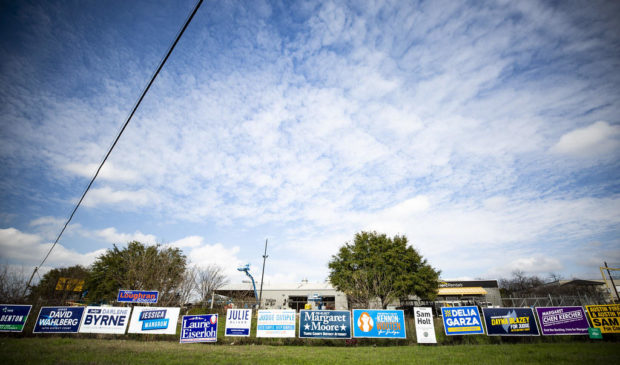Newsletter Signup
The Austin Monitor thanks its sponsors. Become one.
Most Popular Stories
- Firefighters to seek firing of Chief Baker
- Office slowdown sparks new downtown housing ambitions
- City leaders evaluate surprising ideas for water conservation
- Downtown Historic Resource Survey eyes seven new districts eligible for designation
- With cap of $687M, bond task force to weigh $4.4B in city needs
-
Discover News By District
Popular Whispers
Sorry. No data so far.

Photo by Gabriel C. Pérez/KUT
Texas officials try to clarify who can vote by mail, but they might not be able to just say everyone
Monday, April 6, 2020 by Ashley Lopez, KUT
The Texas Secretary of State’s Office sent local election officials an advisory Thursday that was meant to give them guidance on how to handle elections during the Covid-19 pandemic.
In particular, they tried to tackle an issue voting rights groups have flagged since the start of the outbreak: Who qualifies to vote by mail during the pandemic?
Texas law currently limits mail-in ballots to people who will be away from their county on election day and during early voting, people who are sick or disabled, voters 65 and older, and people in jail who have not been convicted.
Voting groups say the term “disabled” needs to be clarified for local election officials, who ultimately decide whether someone gets a mail-in ballot.
In their advisory, state officials said, “the Election Code defines ‘disability’ to include ‘a sickness or physical condition that prevents the voter from appearing at the polling place on election day without a likelihood of needing personal assistance or of injuring the voter’s health.’ (Sec. 82.002).”
Officials said any voter who meets that definition must be able to apply for ballot by mail.
Grace Chimene, president of the League of Women Voters of Texas, said the guidance is a helpful “first step within the confines of the law” in Texas.
“I think it’s all good news,” she said. “It doesn’t change anything but … voters who have something that could be defined as a disability … something that would be impacted if they got the coronavirus, then they are able to apply to vote by mail.”
Chimene said the order stops short of allowing everyone to vote by mail – a change she said would require the Texas Legislature.
“I am not sure that the (secretary of state) can make a change in the election law like that,” she said. “But I think they did a good job by explaining it more. Anything more than that would require a change in law.”
Others said the advisory wasn’t clarifying and that the state could do more to expand the vote. Among them are a bunch of Democratic candidates for office.
Democrat Mike Siegel, who is running for Congress, said this was a “missed opportunity.”
“All the Texas Secretary of State needs to say is: ANYONE can request a vote-by-mail ballot, because we are all ‘disabled’ during the coronavirus pandemic,” he tweeted Friday. “By leaving this vague, the State ensures that less people will vote.”
Julie Oliver, another Democrat running for Congress, tweeted that the order was “framed in an intentionally confusing way.”
Texas PIRG, a consumer advocacy group, said the state should clarify whether all Texans are eligible under these definitions – and the decision not left solely to local officials.
“Hundreds of election officials will be left to make that judgment,” the group said in a statement, “creating great inconsistency and potentially depriving some of (the) eligibility to vote.”
Texas Democrats filed a lawsuit in Austin last month in an effort to force the state to open up vote-by-mail to everyone in light of the pandemic.
Chimene said state election officials are tied to existing law. In addition, Texas’ elections are decentralized, which means the state doesn’t run elections, local officials do. All the state can do is advise at this point.
The guidance also advised local officials to make sure they have “curbside voting” options up and running for disabled voters, which Chimene said could be a big help to stop the spread of Covid-19. It also reminded local officials to offer voters “late voting” options due to a sickness or disability.
Overall, Chimene said she thinks this will help counties be more prepared for the upcoming elections.
“Does it say that everybody can vote by mail? No, it doesn’t say that,” she said. “But this allows counties to have options that they can use to better serve the voters in their communities. That’s what I think.”
This story was produced as part of the Austin Monitor’s reporting partnership with KUT.
The Austin Monitor’s work is made possible by donations from the community. Though our reporting covers donors from time to time, we are careful to keep business and editorial efforts separate while maintaining transparency. A complete list of donors is available here, and our code of ethics is explained here.
You're a community leader
And we’re honored you look to us for serious, in-depth news. You know a strong community needs local and dedicated watchdog reporting. We’re here for you and that won’t change. Now will you take the powerful next step and support our nonprofit news organization?


